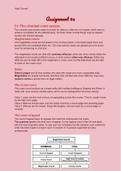Holly Connell
Assignment 6a
P1: The criminal court system
The criminal court system seeks to punish for offence, unlike the civil system which aims to
achieve consolation for the affected party. Criminal crimes include things such as assault,
murder and criminal damage.
Magistrates courts
The magistrates courts are the lowest in the criminal system, most cases begin there and
around 95% are completed there too. The more serious cases are passed up to the crown
court for sentencing or a full trial.
The magistrates courts can deal with summary offences, which are minor crimes where the
defendant is not usually entitled to a jury, or more serious either way offences. Either way
offences can be dealt with in the magistrate or crown court, but the defendant has the right
to insist on the crown court.
Roles
District judges are full time workers who deal with longer and more complicated trials.
Magistrates are unpaid community members who will deal with minor offences, they have
justice’s clerks to advise them on legal matters.
The Crown court
The crown court functions as a single entity with multiple buildings in England and Wales. It
deals with more serious criminal cases, which can be distinguished into three classes.
Class 1 cases are the most serious, encapsulating crimes like murder. They’re usually heard
by the high court judge.
Class 2 offences include rape, and are mainly heard by a circuit judge and presiding judge.
Class 3 offences are the lowest, things like burglary, and are heard by a circuit judge or
recorder.
The court of appeal
The court of appeal takes on appeals from both the criminal and civil courts.
The supreme court is the final court of appeal, it’s the highest court in the UK and deals
with the most important cases. A case won’t be considered by the supreme court unless the
order has been made in a lower court. It consists of 12 justices supported by many
professionals.
, Holly Connell
Image sourced via IvyPanda
P1: PACE and RIPA
The PACE act
The PACE act stands for the police and criminal evidence act. It governs the powers of the
police over the public and individual during investigation. Police failing to follow the PACE
act results in evidence being invalid in court. It applies to not just the police, but anyone in
charge of a criminal investigation. It has four separate codes.
PACE code A Covers the police rights to stop and search people or vehicles without
arresting them. They are only required to record the person’s ethnicity.
PACE code B Dictates the police’s power to search a premises and take any items they find
there.
PACE code C Covers the rules of detention and treatment of people in custody.
PACE code D Controls the methods of identification of those who may be involved in the
offence being investigated, and the keeping/maintaining of criminal records.
PACE code E Is on the tape recording of interviews of those in police custody.
PACE code F Is on the visual with audio recording of interviews of those in police custody.
PACE code G Covers the legal powers of arrest by police.
PACE code H Is regarding the detention of terrorism suspects.
The act is put in place to make sure all evidence gathered in investigations is fair, truthful
and respectful of human rights.
The RIPA
The RIPA stands for the regulation of investigatory powers of act. It controls the way certain
organisations can conduct surveillance on the public.
The interception of communication Covers things such as wire tapping calls and reading
people’s post. It’s permitted in the interests of national security and detecting serious crime.
Use of communications data Includes information taken from phones, emails etc. It does
not include the content of the information, just facts about it. It is allowed in the interests of
national security, protecting/preventing crime, public safety and assessing tax.
Directed surveillance refers to the following/surveilling of people in a way that is ‘covert,
but not intrusive.’1 It is allowed in the interest of national safety, public health, preventing
crime, tax collection and the economic well being of the UK.
Intrusive surveillance covers the bugging of houses and vehicles. It is permitted in the
interests of national security, preventing crime and the economic wellbeing of the UK.
Covert human intelligence sources Refers to informers and undercover officers. They are
permitted in the interests of national security, public health, preventing crime and in the
interests of the economic wellbeing of the UK.
1All Answers Ltd. R v Roberts - 1971. Lawteacher.net. Published August 26, 2021.
Accessed April 29, 2022. https://www.lawteacher.net/cases/r-v-roberts.php




